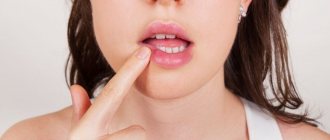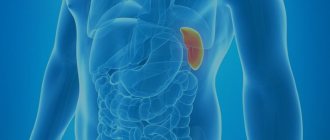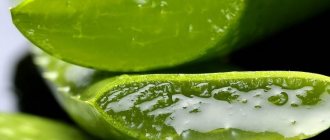What does bitterness in the mouth mean after eating or in the morning: causes and treatment
Bitterness in the mouth is a fairly widespread phenomenon, many people are familiar with it. This is especially true for those who suffer from pathologies associated with the gallbladder, liver, bile ducts, and organs of the digestive system. Why does this symptom occur?
The causes of altered taste are often spicy, fatty, spicy foods, and medications used over a certain period of time. A person suffering from congenital problems with the bile ducts also “puts up” with the taste of bitterness. Constant bitterness in the mouth (and not only after eating) indicates the presence of a serious disease that requires correct diagnosis and adequate treatment.
Bitterness in the mouth - what does it mean?
The main cause of a bitter taste in the mouth is the reflux of bile into the esophagus, which occurs when the liver, gallbladder and biliary tract are not functioning properly. Bile is a digestive fluid that is produced by liver cells and accumulates in the bladder. Here it is not only stored, but also “ripens” and acquires a full acid-salt composition. After “ripening,” the bile enters the duodenum, where it initiates the digestion process.
Bile secretion has a characteristic bitter taste. Healthy mature bile has a certain composition. In addition to acids and metal salts (sodium and potassium), the secretion contains proteins, phospholipids (fats for building cell membranes), cholesterol, chlorine and calcium ions. An unbalanced composition of bile leads to the precipitation of salts. This is how clots, flakes, sand and stones form in the gallbladder. They impede the outflow of secretions, forming stagnation in the bladder and ducts. In addition, the cause of stagnation is often a spasm that accompanies stress and nervous experiences (fear, hostility, anger, hatred).
Against the background of stagnation, the release of new bile continues, which tends to enter the bladder. The human liver secretes up to 1 liter of bile secretion per day. This creates pressure, which forcefully pushes the stagnant secretion, throwing it into the stomach and esophagus.
When and how often does the bitter taste occur?
From when bitterness appears in the mouth, we can guess what causes this symptom:
- During physical activity, if it is also accompanied by heaviness in the right side, it may be a sign of liver disease.
- In the morning - the reason most likely lies in problems with the liver and gall bladder.
- Only after eating too heavy, fatty foods, after overeating - diseases of the gallbladder, bile ducts, liver.
- Bitterness appears after any meal - diseases of the stomach, duodenum, gall bladder, and some liver pathologies.
- Short-term bitterness in the mouth - during a stressful situation or the use of medications that affect the liver and gastrointestinal tract.
- Constant bitterness in the mouth - a possible cause is cancer of the gastrointestinal tract, cholelithiasis, cholecystitis, endocrine or mental illness.
Treatment methods
Basically, the treatment of bitterness in the mouth comes down to taking medications. The specialist selects complex therapy based on the results of tests and instrumental examinations. The gastroenterologist identifies one of three problems:
- Liver disorders. Means are prescribed to stabilize the operation of the “filter”,
- Digestive tract dysfunction. Drugs that affect the digestive system normalize the work
- Uncontrolled bile production. Eliminated by drugs that affect the level of secretion, for example, anticholinergics.
Appears after eating cedar
After eating pine nuts, even a completely healthy person may experience bitterness in the mouth. Usually this phenomenon is mistakenly attributed to the choleretic properties of the product, but such a reaction cannot occur with high-quality pine nuts.
Meanwhile, bitterness in the mouth appears immediately after eating and lasts for several days; sometimes other symptoms of intoxication may appear - nausea and pain in the liver area. All this clearly indicates that the pine nuts were artificially grown and imported from China. Many suppliers pass off Chinese nuts as domestic products, since they are cheaper to purchase. But there are many reasons why it is better to refuse such a food product.
The main causes of bitterness
What does bitterness in the mouth indicate? There are actually a lot of reasons why a person begins to feel this. In this way, the body may try to “indicate” diseases of the digestive system or a gallbladder disease. This sensation may also be a sign of poor nutrition or taking medications of various spectrums for too long (mainly those used to treat the liver).
The main causes are diseases of the gastrointestinal tract (GIT):
- Diseases of the duodenum. Bile from the duodenum, entering the stomach, causes corrosion of its walls. Bile contains acids that cause a feeling of bitterness.
- Gastritis (see symptoms and treatment of gastritis). With this disease, the composition and amount of gastric juice produced by the body changes, the process is also accompanied by poor digestibility of proteins, fats, carbohydrates and other vitamins, and the removal of toxins worsens. Together, this causes heartburn, bad breath, constant belching and, accordingly, an unpleasant taste in the mouth.
- Gastric dyspepsia. The cause of the bitter taste may be difficult digestion caused by disruptions in the functioning of the stomach.
- Gastroesophageal reflux disease. This disease provokes surges of concentrated gastric juice to the very top of the esophagus, from where it enters the oral cavity. It can develop due to the abuse of spicy and fatty foods, as well as constant overeating (even healthy food rich in vitamins and minerals - an excess of it is also harmful).
- Disturbances in motor activity of the stomach. With reduced motility of the biliary tract, bile stagnates in them; with increased motility, there are sharp releases of bile into the duodenum, then into the stomach, esophagus and oral cavity, causing bitterness, burning and heartburn.
- Dysbacteriosis. Under normal conditions, a large number of beneficial bacteria live and function in the human intestine, capable of synthesizing vitamins, creating microflora and generally increasing the body’s immune strength. If the intestinal microflora is normal, then no problems are observed, but if an imbalance occurs, then dysbacteriosis appears, causing bitterness in the mouth.
- Giardiasis. A disease caused by the penetration of Giardia (intestinal parasites) into the body, causing disorders in the functioning of the small intestine. Nausea, bitterness occurs, and sleep is disturbed.
Dental diseases:
- Inflammation of the gums, mucous membrane of the tongue. This occurs if a person carelessly takes care of their teeth, and bad breath adds to the bitterness.
- Increased sensitivity to external interventions - implantation of dental crowns, dentures or fillings. The bitter taste is often caused by raw materials for dentures, fillings or gel for fixing an artificial jaw.
Other reasons include:
- If there is liver dysfunction (any disease), then increasing inflammatory processes negatively affect the production of bile and its transportation through the relevant systems of the body.
- Nervous system disorders, in which the peripheral nerves responsible for the taste buds and sense of smell become inflamed, also alter the perception of the taste of food and make it bitter.
- At moments when the level of glucose in the blood rises, vision begins to deteriorate, a feeling of weakness and heat appears in the palms and soles, along with this, a bitter taste becomes very noticeable in the mouth.
- General intoxication of the body, which is observed when it is damaged by heavy metals such as mercury, lead, copper and others.
- Disturbances in the functioning of the endocrine system lead to the fact that the thyroid gland, together with the adrenal glands, begins to produce huge amounts of adrenaline. As a result of this, the bile ducts narrow, which provokes the release of bile towards the esophagus and the appearance of bitterness.
- Lack of zinc - an important trace element that is necessary for the normal functioning of cells and taste buds in particular.
- Smoking for many years. Long-term exposure to tobacco and its derivatives has a detrimental effect on the taste buds, as a result of which the smoker begins to feel an unpleasant bitterness.
Treatment and elimination
Based on the diagnosis, the doctor prescribes treatment.
Important! If the problem is discovered by the dentist, he will treat carious cavities, install fillings, remove teeth that cannot be restored, detect and eliminate pockets of inflammation, and perform hygienic professional teeth cleaning.
In some cases, after treatment you will need to use pharmaceutical preparations - rinsing solutions and various gels (for example, for stomatitis).
For inflammation of the ear, nose and throat, complex treatment is prescribed, including drug therapy, physiotherapy, and traditional methods.
Depending on the diagnosis and the severity of the disease, the doctor may prescribe :
- antiviral or antibacterial local drugs (sprays and nasal drops, ear drops, solutions for treating the throat);
- antibiotics in tablet form if necessary;
- antipyretics (if the temperature is elevated);
- physiotherapy (anemization, application, ultraviolet irradiation, laser treatment);
- traditional methods (nasal rinsing, inhalation, ear blowing);
- use of sprays and lozenges for the throat (Gexoral, Yox, Grammidin);
- massages, herbal tinctures.
Stay up to date! For endocrine disorders, hormonal drugs are prescribed.
For diseases of the gastrointestinal tract a strict diet is recommended , as well as drug therapy (Smecta, Enterosgel, Polyphepan).
In the chronic form of diseases of the digestive tract, constant adherence to a therapeutic diet is required.
It is necessary to exclude fatty, fried, spicy, salty, smoked, alcohol, soda, processed foods, spices and fast food.
Detected pathologies of the liver and gall bladder are treated with the following drugs:
- Essentiale Forte to normalize liver function;
- Karsil to remove toxins and reduce the load on the liver;
- Allochol is a herbal preparation to improve the functioning of the digestive system and gallbladder;
- Ursosan to improve the flow of bile and dissolve gallstones, helps with cirrhosis, cholestasis, hepatitis;
- Choleretic drug Gepabene .
It is worth noting! If pathologies of internal organs are detected, the patient is advised to give up bad habits (smoking, alcohol).
It is worth reviewing your taste habits and removing coffee from the menu, eating at least 5 times a day to reduce the load on the digestive system.
A medication aimed directly at eliminating the bitter taste is prescribed only as part of complex therapy to combat the underlying disease.
These are sodium thiosulfate capsules.
During treatment, it is very important to maintain a drinking regime , drinking at least 2-2.5 liters of water per day.
Causes of bitterness in the mouth while eating
Sometimes you feel a bitter taste in your mouth while eating. When this phenomenon is one-time in nature, the cause may be the type and method of cooking.
But what to do if the bitterness in the mouth becomes chronic? First, you should consult a doctor. He will be able to determine what disease such a symptom relates to and then prescribe treatment. The main causes of bitterness in the mouth while eating are:
- Cholecystitis is an inflammatory process in the gallbladder, which is accompanied by painful sensations in the side, dry mucous membranes, and high body temperature.
- Dysfunction of internal organs. Diseases of the digestive organs, liver, kidneys, gall bladder.
- Poor nutrition. It is not recommended to eat fatty, fried, spicy, salty foods, soda, and fast food. As a result of their consumption, a feeling of bitterness may occur.
- Acid reflux, vomiting aftertaste. The cause of bitterness is gastric juice, which from the stomach begins to rise through the esophagus to the oral cavity.
- Disturbance of taste buds. The receptors that are responsible for the perception and recognition of taste stop working. All products that a person consumes do not differ in taste for him. This occurs due to excess amounts of phenylthiocabamide in the body.
- Hormonal changes in the body during pregnancy.
- Dental diseases of the teeth, gums, the body’s reaction to a filling or crown.
- Violation of acid-base balance. Accompanied by lethargy, muscle fatigue, joint pain.
If such a symptom appears after eating, it is recommended to adhere to the rules of a healthy diet. Avoid eating fatty, fried, salty, bitter, sour foods, soda, sweets, and baked goods. It is advisable not to convey that food should be easily processed and absorbed by the body.
Diet
The diet should include soft, well-chopped food. Gentle cooking methods - steam, bake, boil, stew. Include puree soups and cream soup in your diet. Bread can be consumed dried, yesterday's bread made from first and second grade flour. Meat – chicken, turkey, lean parts of beef, lean fish. Eggs should be in the form of omelettes, steamed in the oven. Food should be warm, not cold or hot. If there is a symptom of bitterness in the mouth, it is necessary to exclude sausages, smoked foods, fatty, fried, canned, and pickled foods from the diet. It is completely necessary to exclude alcohol, spicy foods, coffee, chocolate, carbonated drinks, pork, and some legumes.
Food poisoning and bitter saliva
Foodborne toxic infection is very often accompanied by a taste of bile due to general toxicosis of the body and malfunctions of the digestive system. This includes vomiting bile and bile reflux. Often, after poisoning, a person temporarily lacks appetite. Food does not enter the stomach, and bile, despite this, is produced by the liver around the clock. It stagnates and some of it is thrown into the stomach and esophagus.
It takes time to normalize the functioning of the digestive tract after the symptoms of poisoning disappear. Then the unpleasant taste sensations will pass.
Clinical symptoms
Impaired sense of taste is associated with a large number of diseases. Depending on the type of pathological process occurring, the patient may experience many associated symptoms:
- state of lethargy and weakness;
- a grayish or whitish coating forms on the tongue;
- pain and discomfort affect the area of the right hypochondrium or the iliac region;
- frequent belching with the smell of consumed food, air;
- feeling of stale breath, feeling of heaviness on the side;
- change in the standard color of the skin and whites of the eyes to yellowish shades;
- slowdown of metabolic processes with hair loss;
- constipation, diarrhea and other intestinal disorders.
If the source of the unpleasant taste is the formation of stones in the cavity of the gallbladder, then the clinical picture is complemented by painful sensations due to their movement.
Bitterness in the mouth in the morning
It is not possible to determine the cause of bitterness in the mouth by one symptom, because the causes of this symptom can be various dysfunctions of internal organs:
- Overeating before bed.
- Reaction of the gastrointestinal tract to foods: salty, fatty, bitter, fried foods, spices, nuts.
- Disruption of the gallbladder. There is a failure in the production and excretion of bile as a result of the manifestation of diseases such as cholecystitis, cholelithiasis, pancreatitis, congestion, and neoplasms.
- The material was chosen incorrectly or the prosthesis, crown, or filling was made. The result is bad breath.
- Diseases and dysfunctions of the digestive organs.
- Intestinal dysbiosis, which occurs after taking antibiotics.
- Diseases in the oral cavity, teeth, gums, white coating on the tongue.
- Bad habits: smoking, alcohol.
- Hormonal disorders.
- Liver dysfunction: jaundice, cirrhosis, hepatitis.
- Unstable psycho-emotional state: stress, neurosis, depression.
- Kidney disorders.
- Pathologies of ENT organs.
- Intoxication of the body with metals: lead, mercury, copper.
- Diabetes mellitus and other endocrine dysfunctions.
Folk remedies
Bitterness in the mouth may be due to medication
In cases where no serious pathologies are found, folk recipes will help get rid of the feeling of bitterness in the mouth.
- Flax seed. To prepare the drink, take a quarter cup of ground flaxseed, add half a liter of boiled water and leave. Drink half a glass in the morning.
- Vegetable juices. Freshly squeezed juices from potatoes, carrots and celery increase the secretion of saliva and thereby help with bitterness in the mouth.
- Decoction of calendula flowers. For half a liter of boiling water you need to take 20 grams of calendula flowers, bring to a boil and leave. It is recommended to take 2 glasses per day for a month.
- Sunflower oil. Keep the slightly heated oil in your mouth for several minutes. The feeling of bitterness should disappear.
- Corn silk. A decoction of corn silk has choleretic properties, it contains fiber, B vitamins, and vitamin E. It helps cleanse the body, get rid of bad breath and stimulate the production of digestive enzymes.
- Rose hip decoction. Rosehip decoction is a choleretic agent and a real vitamin bomb. This drink not only relieves the feeling of bitterness in the mouth after eating, it also stimulates the immune system.
The choice of treatment for bitterness in the mouth depends on the disease that caused this sensation. No matter how harmless this symptom may seem, the cause of its occurrence can be quite serious, so you should not neglect this signal from the body and listen to it: get examined and begin treatment.
Constant feeling of bitterness
When a bitter taste in the mouth appears regularly, this indicates serious disorders and diseases. If you experience persistent bitterness, you should urgently visit a doctor who will help determine the diagnosis of the condition. A regularly occurring bitter sensation in the oral cavity may be a sign of cholecystitis, cholelithiasis, oncological diseases of the gastrointestinal tract, endocrine or mental.
Bitterness in the mouth during pregnancy
During pregnancy, a woman's body undergoes such dramatic changes, both hormonal and physiological, that the appearance of any unusual taste or other strange symptom should be perceived as normal. In the 1st trimester, an increase in progesterone has a relaxing effect on the valve separating the esophagus and stomach, so acid and bile can enter the esophagus, causing a bitter taste, nausea, and vomiting.
In the later stages, heartburn and a bitter taste cause a woman very strong discomfort, this is explained by the growth of the fetus and its pressure on the gallbladder and stomach; this symptom haunts the pregnant woman until childbirth. To reduce the frequency and intensity of this unpleasant manifestation, a woman should adhere to a certain diet - exclude fried and fatty foods, coffee, sour and spicy foods, eat little and often, avoid drinking liquids during meals, and drink only in between meals.
Diagnostics
It is important to know that independently determining the cause and choosing treatment methods is strictly prohibited, since incorrectly selected drugs can only harm the body. The fight against this manifestation should begin and continue only after a specialist makes an accurate diagnosis.
Methods for diagnosing this symptom:
- Blood tests: general and biochemical - help to identify the presence and degree of the inflammatory process, evaluate liver function, parameters of fat and pigment metabolism.
- Analysis of stool for the bacteriological composition of intestinal flora - detects dysbiosis.
- Fecal analysis (coprogram) - reveals disturbances in the digestion of food, provides information about the possible presence of parasites in the intestines.
- X-ray of the abdominal organs - prescribed to identify stones in the ducts and possible calcification of the pancreas.
- Ultrasound of the hepatobiliary system (ultrasound) is an extremely informative method for diagnosing pathologies of the liver, gallbladder and ducts. With its help, you can determine the parameters and location of the gallbladder, bile stagnation, the presence of stones, neoplasms, and polyps.
- Computed tomography of the abdominal organs - with its help you can examine any area in the peritoneum layer by layer and assess the extent of organs affected by pathological changes.
- Endoscopic examination of the gastrointestinal tract (fibroesophagogastroduodenoscopy, fibrocolonoscopy) is carried out to check for the presence of concomitant diseases and for differential diagnosis.
- Immunogram and analysis for tumor markers - given if a malignant process is suspected.
How to remove bitterness in the mouth, the cause of which has not been established?
If the cause of bitterness in the mouth is not determined, it is recommended:
- Frequent meals in small portions are effective for women in late pregnancy, in whom bitterness is caused by the pressure of the fetus on the digestive organs;
- Smoking cessation or restrictions – if bitterness is caused by disorders of the taste buds due to constant exposure to tobacco smoke;
- Taking probiotic medications to normalize the microflora and cleanse them from parasites is an effective method if the bitterness is caused by a parasitic invasion, as is the case with giardiasis;
- Detoxification of the body and cleansing of the intestines with the help of sorbents - helps with bitterness caused by food poisoning;
- A diet that excludes fatty and heavy foods, as well as spices, spicy, smoked foods - helps if a bitter taste in the mouth appears due to indigestion;
- Normalizing sleep and rest patterns, eliminating stress factors, playing sports and walking in the fresh air - if bitterness accompanies neurological pathologies and mental disorders.
Bitterness in the mouth cannot be treated at home with the help of medications, since this is not a disease, but just one of the symptoms of body disorders, each of which requires an individual approach to treatment.
Treatment
Help before diagnosis
To reduce discomfort during diagnostic procedures, it is necessary to reconsider the diet: switch to frequent small meals, eliminate fatty foods and alcohol. Careful oral hygiene with the help of toothpastes, dental floss, and irrigators is important. Doctors advise stopping smoking or reducing the number of cigarettes smoked per day as much as possible.
If you have a strong bitter taste, you should regularly rinse your mouth with boiled water and lemon juice; at work, you can eat a mint candy or a slice of lemon. The feeling of bitterness helps to reduce the rational drinking regime with consumption of at least 1.5 water per day. If the symptom is accompanied by severe abdominal pain, repeated vomiting or other dyspeptic disorders, you should immediately visit a doctor.
Conservative therapy
Therapeutic measures are selected taking into account the cause of bitterness in the mouth. An important component of therapy is a special diet that improves digestion processes, and physiotherapy techniques are also actively used. The main direction is drug etiotropic and pathogenetic therapy. Most often used:
- Choleretic agents
. Prescribed drugs that improve the colloidal properties of bile (choleretics) and stimulate its excretion through the bile ducts (cholekinetics). Medicines are recommended for cholecystitis and cholangitis to normalize digestive function. - Antispasmodics
. The products relax the smooth muscles of the gastrointestinal tract, relieve pain in the abdomen, which often occurs simultaneously with a bitter taste. Analgesics from the group of non-steroidal anti-inflammatory drugs are indicated for the treatment of inflammatory diseases. - Enzymes
. Combined preparations of pancreatic enzymes and bile acids stimulate digestion, due to which the bitterness in the mouth disappears. For hepatitis and infectious liver lesions, they must be combined with hepatoprotectors. - Antihelminthic drugs.
Recommended for helminthiasis that affects the bile ducts and liver tissue - opisthorchiasis, echinococcosis. To eliminate giardiasis, specific antiparasitic medications are effective. - Antiviral agents
. When treating hepatitis caused by viruses B or C, separate protocols are used that involve the use of inhibitors of the assembly and formation of viral particles. Pegylated interferons are also prescribed.









